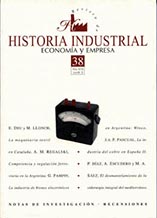The copper industry in Spain II. From 1976 to 2005
Keywords:
Industrialization, Copper Metallurgy, Industrial Policy, SpainAbstract
This paper second part analyses the impacto over the Spanish copper industry during the crisis that began along the seventies. It is set out the “Plan de Reconversión” content of this subsection approved on March 1982 in orden to increase it productivity –by means of the continuous casting of copper rod installation– and to adjust it to the Spain integration on the EEC challenge. A significant part of this study is dedicated to show that the shock derived from the progressive tariff disarmament starting from 1985 meant the Ibercobre collapse and the others significant companies bankruptcy. That the andalusian copper mining went in an extinction phase, and meanwhile the Río Tinto Minera was bought by Freeport-McMoran; that the companies devoted to refine scrap and copper concentrates through electrolysis disappeared; that the Outokumpu Kope Products Oy and Europa Metalli AG got the control of the great part of the Spanish of smelting and copper rolling. Finally, this paper shows that in the last years this industry has had an outstanding growth; that the withdrawal of some foreign companies has made possible that the native capital recovered the rolled factories control; and that the high copper prices had done that the andalusian copper mining had experienced a kind of phoenix.
Downloads
Downloads
Published
How to Cite
Issue
Section
License
We have been applying a Creative Commons Attribution license (CC-BY) since 2019, before that year we had a partial open access policy, which included open access for the first two months after publication, followed by an embargo policy for non-subscribers, as access to the last 4 published issues was restricted to journal subscribers. In contrast, early-view articles were always open access prior to publication in an assigned volume. Until 2024 the access to the last 4 published numbers was restricted to those who were subscripted to the journal.
The author assigns all rights to the publisher. Creative Commons
The author who publishes in this journal agrees to the following terms:
- The author assigns all intellectual property rights exclusively to the publisher for the entire duration of the applicable intellectual property rights.
- The publisher will distribute the texts under the Creative Commons Attribution License, which allows others to share the work, provided that they acknowledge the authorship, its initial publication in this journal, and the conditions of the license.





